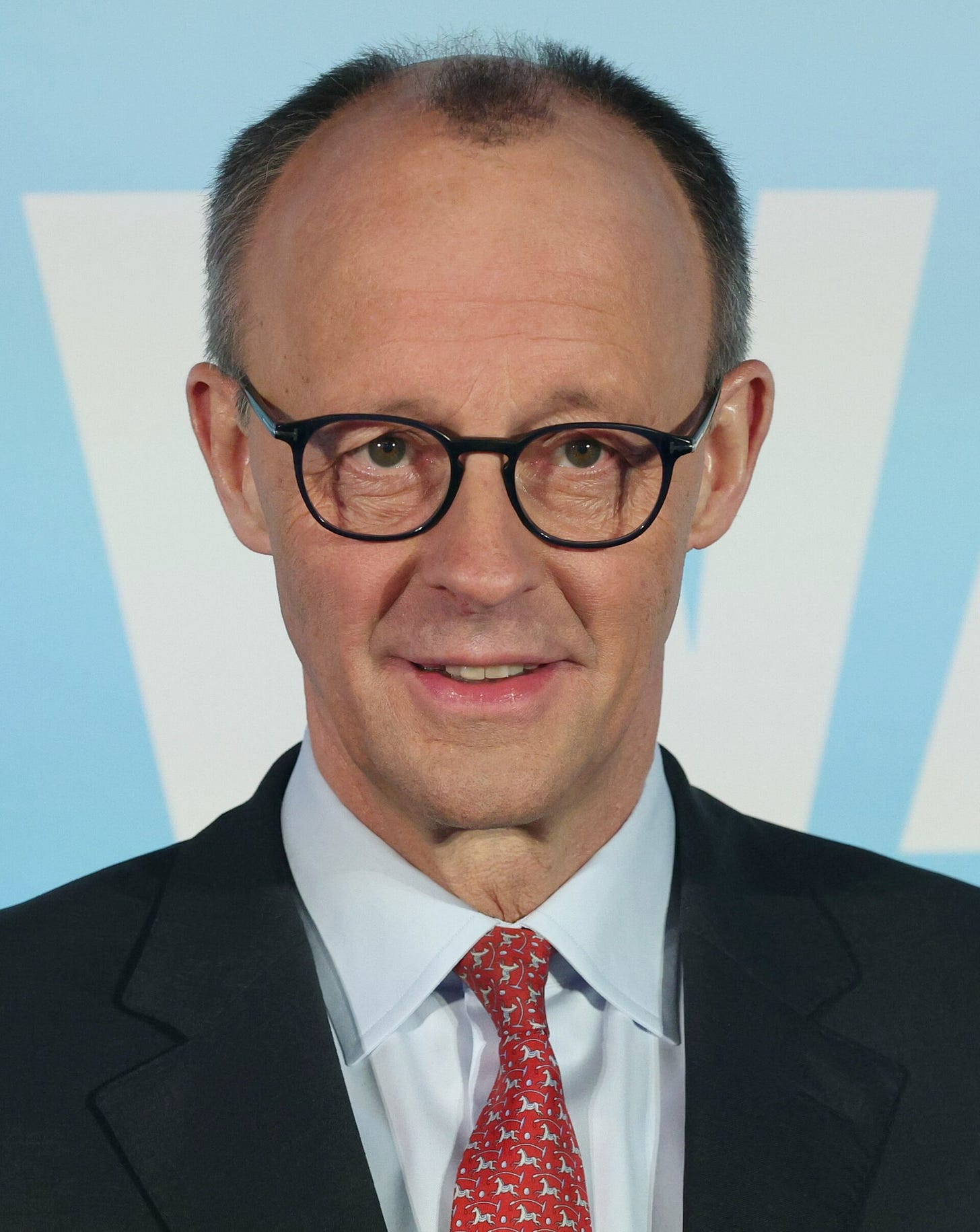The challenges Germany‘s next chancellor will face
#305
My Dear Friend of Democracy,
A new parliament (Bundestag) will be elected in Germany tomorrow, but one thing is almost certain today: the next Chancellor will be a conservative one. Friedrich Merz from the CDU (photo above).
His party, together with its Bavarian sister party CSU (together this party alliance is called the "Union"), can expect around 30 percent of the vote, significantly more than any other party. The only thing that seems unclear is who the Union will form a coalition with. It will need at least the social democratic SPD or the ecological left-centre party, The Greens (Die Grünen). Maybe both. Maybe the economically liberal FDP will also get over the 5 per cent threshold. Then, it could also become part of a new government.
What will change after the election?
Probably less than some hope. Maybe less than some fear.
Basically, there are two significant issues in Germany right now: the economy and security.
Economic growth has vanished in Germany for three years. Many people are therefore putting their hopes in a new government.
However, even for a new government, it will be challenging to combat the causes of the downturn. Germany lives from exports, especially to China and the USA. And the manufacturing industry, which has a high share in this country compared to similarly developed countries, has long lived off low energy prices. The latter will only improve in the medium term, while the former, the signs of global trade in general, point to more barriers and conflicts. A rapid upturn is therefore not to be expected in Germany.
Regarding Ukraine and security policy, the positions of the parties mentioned above do not differ significantly. Support for the invaded country in Eastern Europe is steady.
However, there is a problem. The majority of Germans prefer that the state should not take on excessive debt. A so-called debt brake (Schuldenbremse) has even made it into the constitution.
Germany is not the only country in Europe that wakes up every morning these days and rubs its eyes: two and a half generations have lived in western parts of the continent mainly in peace and freedom. Because the USA secured peace. Because there was a guarantee that whoever broke this peace would have to deal with the strongest army in the world. This certainty is gone. If Putin's little green men cross the border into Latvia, who still counts on the US army becoming part of NATO troops?
I certainly don't. And I know few who see it differently. And I know many who suspect that Putin will test exactly that. How much support will Latvia (or another attacked state) receive from European countries?
In such a case, Chancellor Merz and his majority in parliament would decide whether German soldiers would be sent to Latvia to fight in a war against Russia. Many German soldiers could die in such a war. It is hard to imagine there would be a majority in the German parliament for this.
There is only one reliable way to prevent this situation. The armies in Europe must not only find a structure in the shortest possible time that will enable them to make decisions without the USA but also equip these armies (it would be better if there were only one, a European one) so that Putin has no interest in a war.
This is where the new Merz administration is running into a dilemma. In order to build up such an army quickly, an extremely large amount of money would have to be raised in the shortest possible time. This will not be possible without considerable debt. But support for Merz is based, not least, on a solid budget policy.
What I assume: The new government will agree to new debt, but well below the level needed for a necessary, rapid military build-up. Because there is a lack of support among the electorate. Too many people can no longer imagine a war in my country. Because not even the grandparents' generation has any memories of the most terrible of all wars (that my country started). On the other hand, If you look at the military spending of those states that are on the immediate border with Russia, you can see that the idea of war can be enough to make you jump over your own shadow. I hope that the people in my country have this imagination.
See you in Germany,
Johannes Eber
📸 Sandro Halank, Wikimedia Commons, CC BY-SA 4.0


